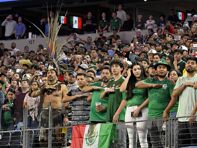Mexico has nearly 10,000 professional players in men’s soccer — the most of any nation — according to FIFA’s annual report.
Mexico also has one of the worst records for homophobia in the sport, with its federation repeatedly punished over a decade for anti-gay slurs used by fans.
To show support for LGBTQ people and diversity, Mexico’s elite tier — the Liga MX — will now use a ball in Pride rainbow colors for the first time, in the final round of Clausura playoffs fixtures, known as Liguilla, starting Wednesday.
The initiative is a partnership with ANADE, the national LGBTQ sports association, who describe it as “a big step.”
Get off the sidelines and into the game
Our weekly playbook is packed with everything from locker room chatter to pressing LGBTQ sports issues.
“We begin the month of May, which commemorates the International Day against Homophobia, Biphobia and Transphobia, on the right foot, showing that by working together, we can eradicate the homophobic chant,” an ANADE spokesperson told broadcaster TUDN.
“Today more than ever, unity will make the change in Mexico.”
Using the official match ball to send out a message of inclusion will be viewed by many as a good move — but the Mexican fanbase is hard to reach.
Related


Mexico fans again demeaned US athletes on American soil with their anti-gay chant
Many Mexico fans refuse to stop using an anti-gay slur in their chants against Team USA and goalie Matt Turner.
By Cyd Zeigler | March 25, 2024
For evidence of that, take a look at the league’s official Facebook page, which is liked by 7.8 million users, twice that of MLS.
Reactions on the post about the rainbow ball are overwhelmingly negative. Out of nearly 50,000, there were 29,000 laughing emojis, and 12,000 angry emojis. At the time of writing, there were only 5,200 positive responses (likes, love hearts, cares).
Nor is the initiative being promoted so far by the Liga MX clubs. “Two days before the start of the Liguilla matches, no classified team has shared on social networks that they are training with the new official ball,” reported local news website MiMorelia.com.
“However, the debut of the ball is expected to take place during the match between Chivas and Toluca at the Akron Stadium on Wednesday.”
The Liga MX accounts have also put up a reel about the ball, captioned: “The pitch is for everyone, this month we premiere the ball for diversity.”
On all these posts, on Facebook and Instagram, dismissive or homophobic comments are the most liked and appear prominently, ranging from “nobody supports that” by one blue-tick Insta account to “What sh*t they keep indoctrinating (in) the sport.”
Visibility campaigns can be impactful but they need to be backed up with meaningful messaging that gets to the heart of the cause.
The Football v Homophobia campaign, based in the U.K., has offered a rainbow ball for a number of years, alongside resources and education. These FvH balls have found homes around the world, including at Zorros LGBT, an inclusive club based in Mexico City, where one is on show in a pinned Instagram post.
More recently, the EFL in England introduced a rainbow ball to mark LGBT+ History Month in the UK. Many clubs across the three divisions worked with their supporters groups to bring forward LGBTQ stories, and in some instances, introduce employees who are part of the community but who had not spoken publicly about that before.
There is little evidence as yet to suggest any of that context is being communicated as part of this latest rainbow ball effort.
Even the swirling design itself isn’t immediately obvious as bring Pride related, which is presumably why the image of the ball in the social media posts has a huge rainbow flag as a backdrop. None of the many hashtags used reference LGBTQ or anti-homophobia.
It seems an incredibly cautious approach, considering Mexico City has had equal marriage legislation since 2010 — the first jurisdiction in Latin America to introduce this. Guadalajara joint-hosted the Gay Games only six months ago, and surveys show rapid improvements in recent years in acceptance of LGBTQ people.
But as we know, the culture of men’s team sports is much harder to shift than public opinion, and professional soccer is Mexico’s biggest love affair by far.
Also, its women’s game is not accelerating at the same rate as in other territories, considering Mexico is one of the 10 most populous nations on Earth.
The national team hasn’t qualified for the last two Women’s World Cups and is currently ranked 31st in the world, below the likes of Finland and Czechia.
They have at least two role models though. Back in 2016, players Bianca Sierra and Stephany Mayor announced they are in a relationship, making them the first out athletes in Mexican sports history.
They moved to Iceland before returning to their homeland in 2020 to play together at Tigres; got married in 2022; and in October, Bianca gave birth to twins, Kenzo and Nova. The proud moms have more than 150 caps between them and recently celebrated another title-winning season at their club.
Yet they seem to be something of an exception in Mexican women’s soccer. Elsewhere, there were only two known out LGBTQ athletes from the country competing at the last Olympics, again in women’s sports — gymnast Rut Castillo and softball player Anissa Urtez.
It all suggests that slapping a rainbow whirl on a football to say you’re doing diversity isn’t the right fit here.
It’s the visibility of actual LGBTQ people in sports, even when represented at a grassroots level, that helps to shift perceptions and reduce discrimination. The “beautiful game” in Mexico, with its machismo image, history of homophobia, and surfeit of men’s pro footballers, simply isn’t at that stage.
But more than that, it’s the hate stirring on social media that is standing out most at the moment. This could end up being an own goal for the Liga BBVA MX, leaving only a feeling of deflation for the LGBTQ fans who watch it.








































